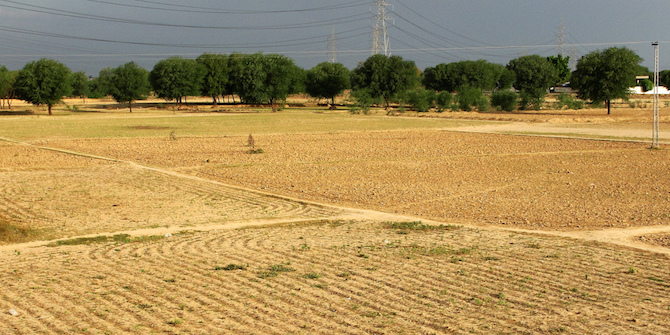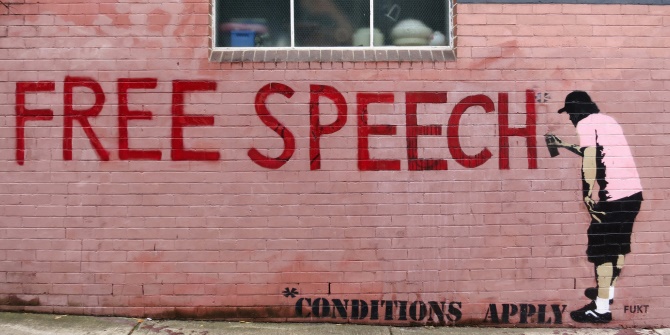Although the ruling Bharatiya Janata Party (BJP) has decided to focus on the national security question in this parliamentary election, Sharik Laliwala argues that the local issue of inadequate drinking and irrigation water weighed heavily as Gujarat went to vote.
 Photo: Withered Ground | Credit: James Frid, Pexels
Photo: Withered Ground | Credit: James Frid, Pexels
On 23rd April 2019, as Prime Minister Narendra Modi accompanied by his most trusted lieutenant Amit Shah went to cast his vote in Ahmedabad in the 2019 general election, his supporters erupted in uncontrollable cheers. While travelling to his voting booth in the state of Gujarat, where he served as the Chief Minister for nearly 13 years, Modi repeatedly makes it a point to organise a road show – including at the cost of election commission’s model code of conduct. In an unusual remark post voting, Modi exhorted nationalist sentiments among Indian voters by asserting that voter ID is more powerful than IEDs used by terrorists.
Away from this celebratory hustle and bustle on voting day, in Kutch district of Gujarat, an entire village hit by water scarcity decided to boycott the election. Coupled with the mass migration of shepherd communities, Kutch witnessed a 4 per cent drop in voter turnout in comparison to 58 per cent in 2014’s parliamentary election – even as Gujarat experienced an all-time high voter’s turnout at just above 64 per cent.
Similar scenes of election boycott played out in Amreli and Jamnagar district in the Saurashtra region of Gujarat. The residents of a few villages in these two districts are at a tussle with mostly private insurance companies, mandated via the Prime Minister’s Crop Insurance Programme, who have refused to pay adequate compensation for their crop failure claims caused by an acute water crisis. Whereas in Ahmedabad, the city where Modi voted, a roughly 15-kilometre long stretch of Sabarmati Riverfront passing through the city is filled with water to accommodate tourist-friendly boat services inter alia. The water stored to add charm to the Sabarmati Riverfront is diverted from the giant Sardar Sarovar Dam over Narmada river as this beautification project has led to the death of the Sabarmati river’s original source. Narmada river’s water is originally reserved for drinking water and irrigation purposes.
In early 2018, the government of Gujarat issued a notification advising farmers not to sow their summer season’s crop. In the previous year, the state had experienced a rain deficit of over 10 per cent, although the Kutch, Saurashtra, and northern Gujarat belt suffered more. Continuous rain deficits forced the state government in mid-2018 to launch a programme to revive 32 monsoon rivers.
This crisis situation only intensified in the following monsoon (June to August/September 2018) as Gujarat received just above 75 per cent of its average rainfall of the last 30 years. Kutch district had less than 30 per cent of its average rainfall while northern Gujarat received only half of its average rainfall. Saurashtra region suffered a 35 per cent monsoon deficit in 2018. In December 2018, three months after the end of monsoon season in 2018, over 50 talukas across 15 districts of Gujarat were declared as drought affected with a provision of relief package for farmers and shepherds. At that point, ill management of water reservoirs meant that over 200 dams were about to completely dry. This situation has only exacerbated since then: Saurashtra region’s 138 small and large dams had only 11% water in their reservoirs as of April 2019.
Vipul Kaderiya, a second-generation farmer in Devda village of Porbandar district in Saurashtra region, is a farmer with less than 4 acres (10 bigha) of land. Drinking water arrives once every 15 days in his village. For the rabi (winter) crop, water sometimes arrives at 3am at night for a few hours – farmers have no option but to irrigate their land in the cold wind of winter.
The lack of water affects the entire rural economy. For the two hours that I sat in Kaderiya’s shop selling hardware tools not a single customer arrived. Earlier making up to 12 thousand rupees a month through his store, for the last three years, he has earned less than 4 thousand rupees a month. A commerce graduate, Kaderiya is planning to follow the course that his fellow villagers have taken: to leave the village selling his land to move to a nearby small town. Roughly 35 per cent of the houses, mainly belonging to the upwardly mobile, agrarian Patel community, have left the village to either work in factories or to start a small store in big cities of Gujarat such as Ahmedabad, Rajkot, Vadodara and Surat.
The problems only begin with water scarcity. Non-payment of crop insurance or lower claims’ approval apart from the selling of live stocks follow. For instance, in Bagsara taluka of Amreli district in Gujarat, only 19 per cent was paid to farmers of their claims for failure to cultivate cotton. Its neighbouring Vitthalpur taluka’s farmers were paid only 0.92% in case of crop failure in some cases.
The Patels (also known as Patidars), the caste group that Kaderiya comes from, have organised themselves in the last few years to demand the reserved quota in public jobs and education from the government led by the Patidar Anamat Andolan Samiti (PAAS; Patidar Reservation Movement Council). In early 2019, the government of India granted a 10% quota to the poor among the unreserved communities of India. Although this move has somewhat suppressed the Patel quota movement, their original demand to be declared an Other Backward Class (OBC) community guaranteed a 27 per cent seats in public jobs and education remains unfulfilled.
Regardless of this pending demand, the Patels have realised that the roots of youth unemployment and lack of education in their community hark back to the agrarian crisis suffered pan-caste. Accordingly, they are rallying the farmers from all communities to seek justice. For instance, in December 2018, PAAS organised a 125-kilometre long farmers’ march in the Saurashtra region. Through this march, the farmers demanded higher minimum support prices for crops, better supply of water for irrigation, and fair compensation in case of crop failure. Hardik Patel, the 25-year-old head of PAAS, has recently joined the Congress Party and is vocal on the ongoing agrarian distress.
Despite these visible fault-lines in Gujarat’s politics, the BJP has decided to focus, with a renewed vigour post the recent escalation of tensions with Pakistan, on the national security question. Some of the party workers that I interacted with during my fieldwork insist that local issues such as the water crisis should not matter during a national election. In fact, in Gujarat, where the BJP is ruling for more than 2 decades, the state government’s Water Supply minister, Kunvarji Bavaliya when questioned by women about the drinking water crisis in a village in Rajkot district of Gujarat, complained that the particular village did not vote in his favour.
In this electoral discourse divided between the issue of national security and a growing farmers’ distress, the result’s day, 23rd May – scheduled exactly a month after the day Gujarat voted – will tell which side found more favour among the voters.
This article gives the views of the authors, and not the position of South Asia @ LSE blog, nor of the London School of Economics. Please read our comments policy before posting.
Sharik Laliwala is a researcher on the history and politics of Gujarat based in Ahmedabad. His writings have appeared in Indian Express, BBC, Wire, Asia Dialogue, Mirror. He tweets @sharik19.







